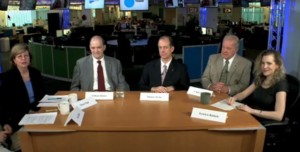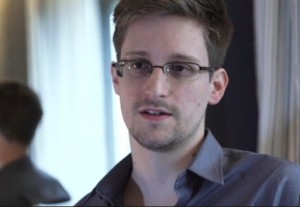When President Obama was confronted with the revelations of NSA telephone and Internet spying exposed by Edward Snowden, he resorted to the sort of predictable statements we have heard from other officials: that secret government surveillance is keeping us safe by thwarting terrorist plots; that exposing it to the US public helps our enemies; that it is only a very modest encroachment on our privacy; that we need to have a “balance” between liberty and security; and besides, the surveillance is only done with court-issued warrants, and thoroughly overseen by Congress.
In other words, all this concern and outrage around the Snowden leaks is a lot of “hype” that is blown out of proportion and nothing we need to worry ourselves about. Go back about your lives. There’s nothing to see here.
Those who want to be reassured may have felt some comfort, but most of what Obama said is demonstrably false. One of his biggest misstatements (shall we use the word lie?) is that “nobody is listening to your telephone calls.”
We know from our investigating, and from firsthand accounts by NSA insiders, that the government has been recording and storing the phone calls of more than 500,000 people, many of whom are American citizens with little, if any, probable cause to suspect they are connected with terrorism. By hiding the fact that mass recording of our phone calls is taking place, Obama can still publicly say that “nobody is listening.” But even that claim is false.
William Binney was a top official at the NSA who developed much of their foreign surveillance network until he resigned in protest over the Bush administration’s illegal domestic surveillance in 2001. He is one of the whistleblowers who appears in Seizing Power.
http://youtu.be/vBgLQeBaTHA
In a recent interview with The Daily Caller, Binney said “There are about three billion phone calls made within the USA every day, and then around the world there are something like ten billion a day. But while they may not record anywhere near all of that, what they do is take their target list, which is somewhere on the order of 500,000 to a million people. They look through these phone numbers and they target those and that’s what they record.” NSA typically uses the two degrees of separation or “two hops” method, where whomever a targeted person corresponds with is also recorded, and every person corresponding with those people is recorded as well. From there, they analyze the “metadata” to decide which of the recorded calls to listen to and transcribe.
The main obstacle preventing the NSA from recording and storing every single phone call in the US is the shortage of digital storage capacity. To deal with this “problem” the NSA has a major effort underway to vastly expand their storage capability at a number of data centers, including a huge new facility under construction in Bluffdale, Utah that will be able to store unheard-of amounts of captured data. This is designed to serve as the “cloud” for intelligence and law enforcement personnel to instantly access the phone and Internet activity of every American.
It is probably not an exaggeration to say they will not stop until there is no longer any form of human privacy anywhere in the world.
-David Kasper

 Two of the National Security Agency whistleblowers who appear in Seizing Power, William Binney and Kirk Wiebe, along with Thomas Drake and attorney Jesselyn Radack, did a
Two of the National Security Agency whistleblowers who appear in Seizing Power, William Binney and Kirk Wiebe, along with Thomas Drake and attorney Jesselyn Radack, did a 